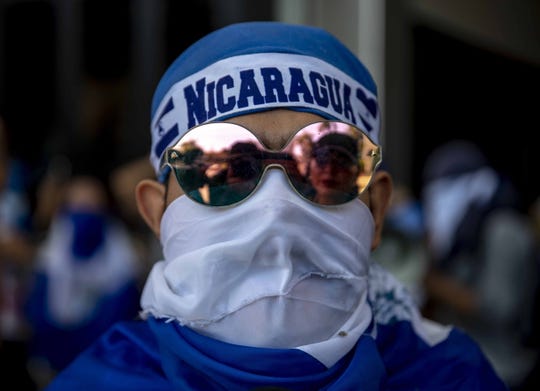Nicaragua is the next Venezuela
The Nicaraguan people are desperate for something better. And they need America to help make it happen. Without intervention, it will only get worse.

This time last year, our nation was fixated on the Central American country. April 28, 2018 saw hundreds of thousands of protestors take to Nicaragua’s streets — the largest protests in a generation or more. Students, workers, priests, and farmers demanded reforms and the resignation of the dictator Daniel Ortega and his wife, Vice President Rosario Murillo. Americans stood in solidarity with the marchers, believing that it marked the beginning of a democratic spring for the Nicaraguan people.
Instead, the dictatorship tightened its grip. The past year saw the murder of more than 500 protesters, the imprisonment and disappearance of more than 1,200 others, and the flight of more than 50,000 Nicaraguans. But instead of ratcheting up the pressure, America’s leaders shifted attention from Nicaragua to Venezuela. Sadly, this only makes it more likely that Nicaragua will follow Venezuela’s failed path.
Nicaragua today can be compared to Venezuela five years ago. Daniel Ortega is following Nicolas Maduro’s playbook to a tee.
Much like Venezuela in 2014, the initial protests in Nicaragua threatened to topple the regime. Ortega, like Maduro, cracked down swiftly and brutally, using the military, the police, and paramilitary gangs to target peaceful protestors and even the Catholic Church. After murdering so many, the regime is sparing no expense at suppressing further protests. Earlier this year, new police officers were seen training with Russian military equipment, including submachine guns and rocket-propelled grenades.
Ortega copies dictator playbook
Simultaneously, Ortega bought time to cement his rule with the promise of dialogue. The first round of talks, held with a group called the “Civic Alliance,” collapsed last summer. The second round fell apart last month. The regime, which recently tried to buy goodwill by releasing into house arrest roughly 200 political prisoners, still says it will “continue working toward national understanding.” A gullible international community seems to think he means it.
Finally, Ortega has copied Venezuela by turning to communist Cuba, which specializes in repression.
Like Venezuela, Nicaragua has long leaned on the Castros for training and support, stretching back to when Ortega himself trained in Cuba. In our conversations with members of the Nicaraguan military, they told us that Cuban and Venezuelan experts trained the paramilitary forces behind last year’s crackdown. The police and military also use Cuban-style repressive tactics. Former prisoners report hearing Cuban accents in Nicaragua’s prisons, where torture and rape are all too common.
Such brutality has crippled the protest movement. But the desire for accountability and democracy remains strong, especially as Nicaragua’s economy crumbles. Already the Western Hemisphere’s second-poorest country, its economy is now expected to shrink by 5% this year. A country riven by poverty is growing poorer by the day, with prosperity more distant than ever.
Nicaraguans need American help
As we have heard firsthand from dissidents and exiles, the Nicaraguan people are desperate for something better. And they need America to help make it happen.
To its credit, the Trump administration has tried to hold Ortega accountable. Over the past year, it has signed legislation and issued multiple rounds of sanctions on Nicaragua’s oppressors — including some just last week. But none of the sanctions are strong enough. The U.S. has also shown support for the pointless dialogue that plays into Ortega’s hands.
Many pro-freedom Nicaraguans feel abandoned by the United States. The Trump administration can address their concerns — and support democracy in Nicaragua — by taking several long-overdue steps.
First, America must rally international pressure on Nicaragua, just has it has done regarding Venezuela. The administration should urge Latin American countries and the European Union to apply sanctions of their own. The U.S. must also stay vigilant in the Organization of American States. After his fraudulent 2016 election, Ortega tricked the OAS into signing an agreement to enact reform, only for nothing to happen. The dictator is trying the same trick again.
America must sanction Ortega
Finally, America must enact much stronger and broader sanctions, visa restrictions, and criminal indictments. The goal should be to force Daniel Ortega to step down.
This starts by sanctioning Ortega himself. It also requires targeting active and retired military officials and entities responsible for the violence against peaceful protesters. And sanctions are warranted against many of Nicaragua’s business leaders, who enjoy wide latitude under Ortega and therefore back him. Without the business community’s support, Ortega’s rule would fall apart.
The stakes are high. Without such action, Nicaragua will likely collapse into an even worse dictatorship and Cuban domination, as in Venezuela. America can’t just wait for that to happen. We can’t keep ignoring Nicaragua.
Marion Smith is executive director and Carlos Ponce is senior fellow and director for Latin American programs at the Victims of Communism Memorial Foundation. Follow them on Twitter: @smithmarion and @ceponces

